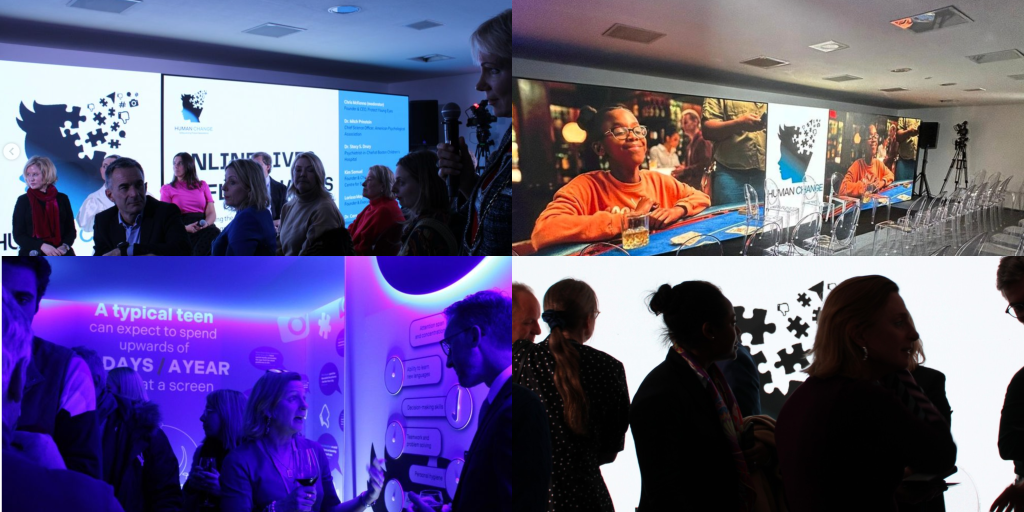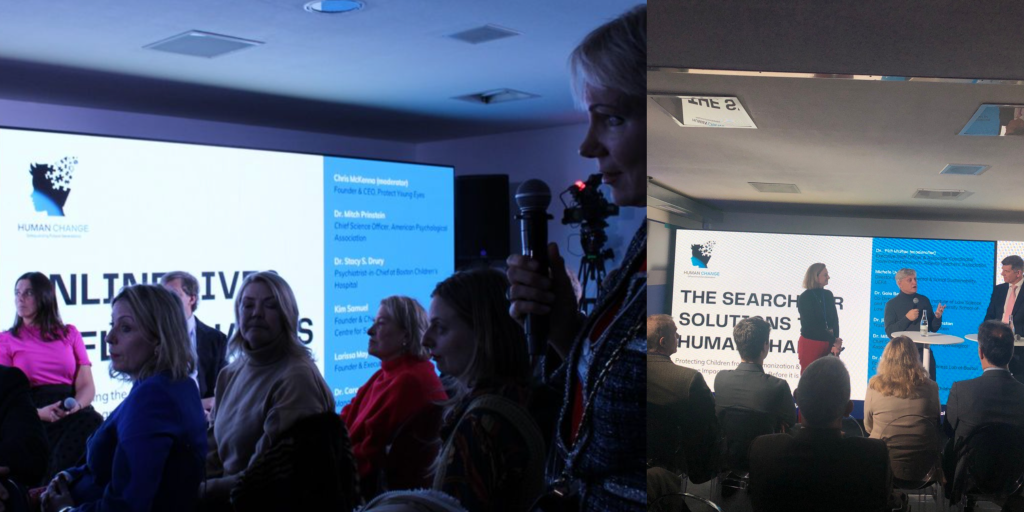In our second focused blog post on the Human Change global advocacy campaign, launched during the World Economic Forum in Davos, we explore key insights and developments. This campaign, aimed at transforming how the future workforce interacts with social media and digital life, featured Arno Luginbühl from Kitoko People, who provided exclusive perspectives.
We also delve into the critical session, „The Search for Solutions to Human Change,“ which emphasizes protecting children from the negative impacts of technology and dehumanization. This session underscores the urgency of addressing these issues promptly, aligning with the campaign’s broader objectives of awareness and transformation.
What you will read
In this second session, panelists shared a variety of effective interventions that could protect children from the negative impacts of technology. The discussion spanned a broad spectrum of solutions that were being proposed and implemented globally, from educational reforms and family-based strategies to national and international regulatory initiatives.
The panel examined case studies and innovative approaches that had shown promise in fostering healthier digital habits and protecting children’s innate humanity in the face of pervasive technology.

photos from human change
Let’s dive in with some stats:
- Around 39.2% of 6- to 16 years olds experienced deterioration in mental health since 2017. (NHS 2017).
- 57% of the future workforce say the always sleep with their phone by their bed. (Childwise).
- Spending just one hour a day on social networks reduces the probability of a child being happy in almost all aspects of their life by around 14%.
The panel started with an interview with the director of social responsibility Michael Uva. In his eyes the statistics are very dramatic. The sport can and must be an important role to act now.
Engaging in physical activity is not only the best solution to promote children’s physical, mental and emotional well-being. Uva elaborated on how football serves as a potent remedy for the feelings of loneliness and social isolation that can arise from excessive digital device use. Similar to various other sports, it not only fosters real-world connections but also offers a refuge from the constant influx of digital stimuli.
Gaia Bernstein says that addressing the issue of digital addiction encompasses several key points:
- Firstly, implementing regulations has been suggested as a potential solution, underscoring the need to establish a robust legal framework. This digital addiction phenomenon largely exploits the vulnerability inherent in human nature.
„This digital addiction phenomenon largely exploits the vulnerability inherent in human nature“. – Gaia Bernstein

Importantly, the goal is not to regress to the ways of the 20th century but to embrace and develop better technologies. However, one significant hurdle is the reluctance of tech companies to change, primarily due to their existing business models, which lack the incentive for transformation.
To tackle this issue, there are two primary approaches being considered. The first involves direct regulation of specific features that contribute to addiction, such as the elimination of infinite scrolls. Yet, a challenge arises in that companies tend to devise new features once previous ones are banned.
„Yet, a challenge arises in that tech companies tend to devise new features once previous ones are banned“. – Gaia Bernstein
Transparency is another critical aspect that requires attention within the tech industry. Furthermore, limiting access to user data and controlling push notifications can have a profound impact on the business model. Tech companies might find it less appealing to operate under a model that doesn’t profit from users‘ time, necessitating a reevaluation of their approach. Banning addictive features such like no more infinite scrolls present possible solutions. The problem here is you ban some and they come up with new features.
„Putting pressure on companies and their business model, for example prohibit data collection, forces them to rethink their business model.“ – Gaia Bernstein
Pressuring companies and their business model, for example prohibit data collection, forces them to rethink their business model. So they don’t make any money with our time. An intriguing statistic underscores the extent of the issue: young people scroll through 1.3 kilometers of text more than they walk, emphasizing the urgency of addressing digital addiction in today’s society. Finally the objective is not to oppose technology. Instead, it involves reshaping or modifying the market dynamics and altering the business model.
Mitch Prinstein also sees it as an important contribution to addressing the problem in delivering even more evidence research and facts about the brain and its change through social media. Science must be used to drive and effect social change on this issue. Statistics show that young people use their cell phones up to 400 times a day.
„Science must be used to drive and effect social change on this issue“. – Mitch Prinstein
Stacy Drury appeals to parents to take advantage of this opportunity and educate future generations. A big challenge in this topic is that no one is talking about it. We need to foster a cultural shift in norms because we cannot afford to wait for the United Nations to reach an agreement. Every day, we are losing young people to mental health challenges. Far too few people are talking about this issue.
„We cannot afford to wait for the United Nations to reach an agreement. Every day, we are losing young people to mental health challenges.’’ – Stacy Drury
As the day concludes, we recognize the power of collective progress. Arno Luginbühl highlights that not only the DACH-Region but also the global community has a significant journey of catch-up ahead. At Kitoko People, we are dedicated to fostering a healthy workplace environment, focusing on the appropriate use of digital media by the future workforce. It’s time to address this challenge head-on – let’s take action now.
Don’t miss our first blog post from the World Economic Forum series, exploring behavioral changes from digital addiction in the Future Workforce. Click here for insightful analysis and stay updated on this critical topic in the digital age!
Thank you to the Human Change for making this event possible!
Panelists detail list:
- Michele Uva, Director of Social and Environmental Sustainability at UEFA,
- Dr. Jim Winston, Trustee of the Winston Family Foundation,
- Dr. Mitch Prinstein, Chief Science Officer, American Psychological Association,
- Dr. Michael Rich, Founder of the Digital Wellness Lab at Boston Children’s Hospital,
- Dr. Gaia Bernstein, Co-Director of the Gibbons Institute of Law Science and Technology at Seton Hall University School of Law,
- Dr. Stacy Drury, Psychiatrist-in-Chief at Boston Children’s Hospital.
At Kitoko People, we help to understand, develop and retain the future workforce. Interested? Contact us on +41 79 575 44 08 or subscribe to our newsletter.







